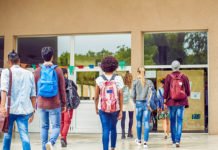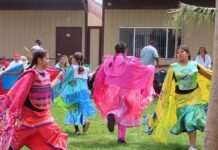
Soboba Band of Luiseño Indians
Special to the Valley News
The annual American Indian Science and Engineering Society National Conference is a one-of-a-kind, three-day event focusing on educational, professional and workforce development. Attendees include Indigenous high school and college students, educators, professionals, Tribal nations and Tribal enterprises, universities, corporations and government agencies.
The conference works towards achieving the AISES mission by providing students and professionals access to career pathways, professional and leadership development, research and networking that also meaningfully incorporates Indigenous culture into its signature event. This year’s AISES conference was held Thursday through Saturday, Oct. 19-21, in Spokane, Washington, and 10 participants, ages 12-17, from the Soboba Tribal TANF arrived Tuesday, Oct. 17.
The conference kicked off a day early for middle to high school students with an array of interactive STEM booths to explore. Students are hands-on with STEM themed ideas and have chances to win great prizes.
“Our youth also attended the AISES college and career fair that attracts professionals and college recruiters from corporations, government agencies, and colleges and universities,” Soboba TANF Program Specialist II Angelica Crawford said.
During the conference, chaperones attended the opening ceremony, STEM Day activities and the student social dance that was held for the youth.
The STEM activities day included hands-on STEM-themed ideas and challenges. The full afternoon of activities and information was a great start to the conference. A marketplace was available for middle school and high school students and educators to learn more about AISES PK-12 opportunities. Chemistry, computer programming, water filtration, construction and cybersecurity were just some of topics covered with fun, interactive activities offered throughout the afternoon Wednesday, Oct. 18.
Students could choose from several workshops that were available throughout the conference. These included “Resilience Strategies to Stay on the Path to Becoming a Physician,” “Data Science Career Networking and Panel Workshop,” “From Sci-Fi to Reality: How Places like JPL Make it Happen,” “STEM and Leadership Careers in the Forest Service” and “Brighter Future Through Solar Energy.”
Seventh-grader Nowaniiki Resvaloso was at the conference for the first time and attended many of the business workshops that were offered. A favorite for him, along with 14-year-old Kevin, was the session on Stickgames, also referred to as Handgames, presented by Kimberlee Blevins, a graduate student at Sitting Bull College. The traditional Indigenous game has been played since the beginning of time throughout North America. It has been referred to as a game of intuition, but requires skill, engagement and eagerness to learn. Handgames is still a practiced tradition throughout Indian Country across all levels. The traditional game is also used to teach probability. Blevins holds two associate degrees in pre-engineering and Native American leadership, and a bachelor’s degree in environmental science. She is currently completing her master’s degree in environmental science with a focus on atmospheric science. Blevins enjoys working with Indigenous youth on STEM projects and her goal is to decolonize STEM spaces.
Kevin, who is currently in eighth grade, said he plans to pursue engineering with the Army Corps of Engineers or become a Navy SEAL, both things he learned about at the conference. The workshops he attended were, “Imagine working for the US Army Corps of Engineers, finding your people and a career” and “Indigenous Representation in the Navy: Honoring Warriors at Sea & STEM Opportunities.”
The students attended another workshop, called “The Future of AI and Indigenous People.”
“As AI continues to advance and permeate various aspects of our lives, it is essential to examine its implications for Indigenous People, considering our unique cultural, social and economic contexts. This Accenture panel will explore the opportunities, challenges, and potential risks associated with the integration of AI technologies. By doing so, we aim to foster a better understanding of how AI can be harnessed to benefit Indigenous People while respecting our rights, traditions and sovereignty,” according to the description.
The session was facilitated by Mark Hunter, managing director with Accenture, one of the world’s largest consulting firms. He also serves on the AISES corporate advisory council. He is a former AISES college chapter president and his current career journey started with a connection he made at an AISES National Conference.
The variety of workshops covered social and behavioral sciences, engineering, health and medical sciences, life sciences, geoscience, computer and information science, biological science, art, architecture and design, as well as research projects in these areas. There were also those that focused on professional and workforce development, education and student success and college and career readiness. This conference offers something for everyone and is a valuable opportunity for Indigenous youth to learn so much in one place.
Crawford said the group took some time out for sightseeing while in the area.
“We were able to walk the Riverfront Park,” she said.
Located in downtown Spokane, Washington, the 100-acre park is considered an urban oasis. The Spokane River winds through the park and cascades over basalt rock and two dams to create the largest urban waterfall in the country. The group from Soboba enjoyed the Bloomsday Sculptures, the Looff Carrousel and the 15-minute Numerica SkyRide which descends over 200 feet across the river.
“We did go on the SkyRide to get a better view of the falls,” Crawford said.
Virginia, 12, is in seventh grade and said going to Riverfront Park was her favorite part of the trip but she did attend many of the workshops.
“I learned that computer people are trying to make apps better,” she said.
For more information, visit http://www.aises.org.















